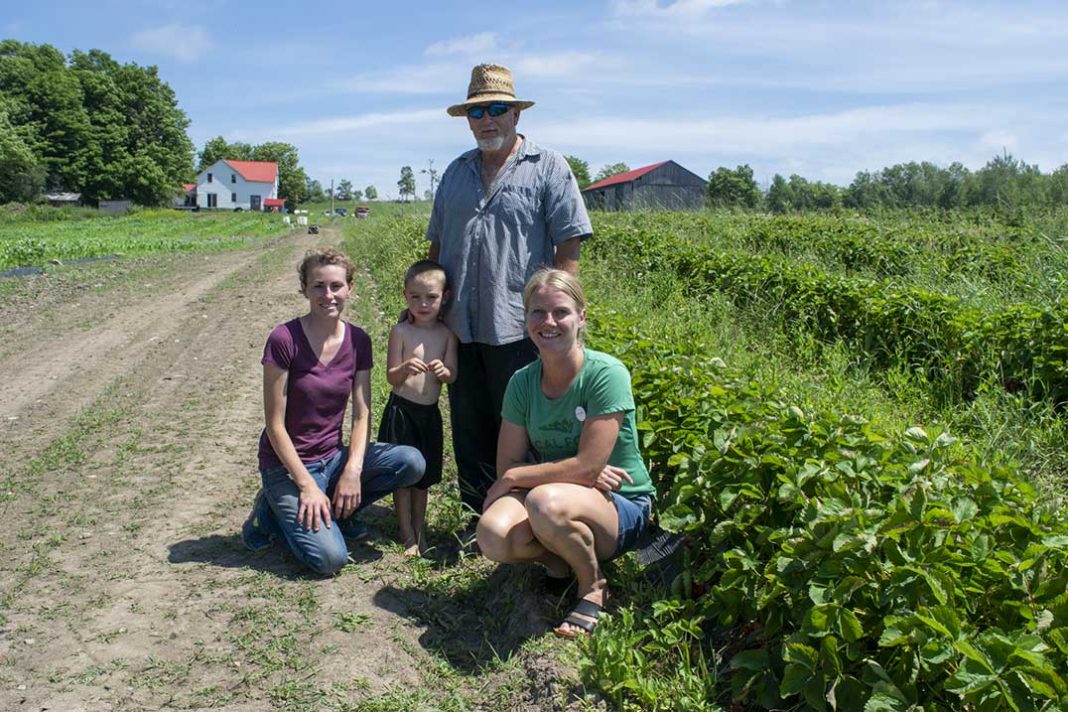SHEGUIANDAH – The summer of 2019 offered a remarkable strawberry picking season at Sheguiandah’s Pike Lake Farms, and not just because the picking went into a fifth week—this is the first strawberry crop they have had in nearly a decade after wintering deer destroyed their plants.
“This has been a phenomenal year because of the weather. It’s the perfect weather for strawberries,” said Pike Lake Farms owner Greg Pyette. He runs the operation with his family members, including daughter Katie Cyr who was helping out during the Manitoulin Garden Tour’s scheduled stop at their property on July 19.
The Pyette family farm has gone through several iterations during its 35-year existence. They were mainly focused on beef farming before attempting to grow produce such as strawberries a decade ago.
“We were devastated by the deer wintering. They took about 100,000 plants over the winter,” said Mr. Pyette. “That was about eight years ago. It takes two years after you plant strawberries to get to the point where they produce berries.”
“The plants were still there, but they pulled them out far enough that they wouldn’t grow,” said Ms. Cyr.
The family applied to the Ontario Ministry of Natural Resources and Forestry (MNRF) for a deer removal permit, a process that took four years.
“You have to do that because they will take your livelihood,” said Mr. Pyette.
After the deer devastation, the Pyettes decided to stick with cattle for another several years before they got their strawberry plants in the ground. This is the first year in which that new batch of plants has borne fruit and, by all accounts, the plants are making up for lost time.
“We’re on par with farms in Elmira this year. We’ve actually had wholesalers from southern Ontario looking to buy from us because we were earlier than them,” said Mr. Pyette.
Pike Lake Farms offers a pick-your-own patch that officially opened for business on Canada Day, though the berries had been ready for a week or two before then. Their main property consists of 150 acres, of which 20 are currently being cultivated. They also have another hundred acres on the Bidwell that used to be for raising cattle, which has remained as a hayfield this season. They did not reach their fullest planting potential this year because of the conditions in the spring.
“We didn’t get everything in because of the wet spring. We just got too far behind with all the rains we had and the mud,” said Mr. Pyette.
One thing that greatly helped in the revitalization of their farm was the introduction of plasticulture techniques.
“We’ve perfected that for growing strawberries in the North. We actually won a premier’s award for excellence eight years ago for that,” said Mr. Pyette.
He showed off his machine which takes flat ground, forms it into raised rows, lays down a strip of drip irrigation tape, drops a sheet of plastic on top and tucks the edges under the soil so it stays secure. Then, an adjustable wheel pokes holes through the sheet and into the ground and workers drop strawberry plants into each one.
Plasticulture is a controversial topic due to its use of plastics in an age when concerns about plastic pollution are gaining prevalence in common discourse. Mr. Pyette admits that the drip irrigation tape is made of conventional plastic; however, the farm’s rows are of a standard length every year and he has machinery that can pull up and coil the drip tape so that he can re-use it in subsequent growing cycles—nearly elminating the waste factor.
As for the main plastic mulch sheets that sit along the top of the rows, Mr. Pyette buys biodegradable plastic that has a five-year shelf life before it begins to decompose. Each planting of strawberries is a three-year commitment, so this offers the plastic’s full benefits before it begins to decompose.
The main benefits of using a plastic mulch sheet in this manner are that it vastly reduces or eliminates problematic weeds and it saves a considerable amount of water. There is roughly four miles of irrigation piping through the strawberry patch alone and the water comes directly from Pike Lake. Because of his daily take of below 50,000 litres, Mr. Pyette does not require a permit to tap into the water source.
Other plants at Pike Lake Farms include beans, tomatoes, peas and sweet corn. They also have a field full of a brand new type of potato with a low glycemic index value, meaning people with diabetes can eat them without worrying about spikes in their blood sugar. These potatoes were only released to growers last year.
When the strawberry season wound down, the August raspberry picking season quickly got underway. Although they did get a fair amount of fruit, numbers were a tad smaller than they had hoped.
While at the time of writing, all of the Pike Lake Farm’s produce was being sold at their property on Pike Lake Road in Sheguiandah, a number of retail outlets on Manitoulin Island had expressed interest in carrying their products, said Mr. Pyette. Working through the details of that supply chain had to be put on hold during the season’s height.
“We’re just too busy picking berries,” he said, flashing the smile of someone who is finally seeing his hard work come to fruition.
Check with your local grocer to discover what locally grown products can be found on Island store shelves. Some offerings are now available at Orr’s Valu-Mart in Little Current. The family is about to begin harvesting diabetic-friendly potatoes as well as conventional red and white varieties. Visit facebook.com/PikeLakeFarms for further details.





